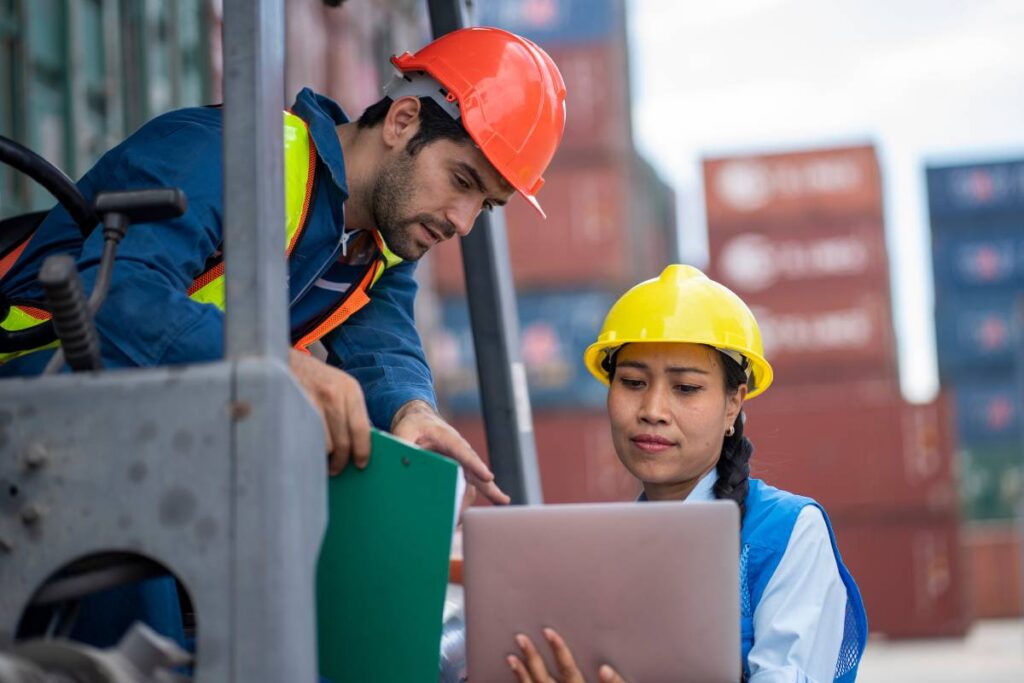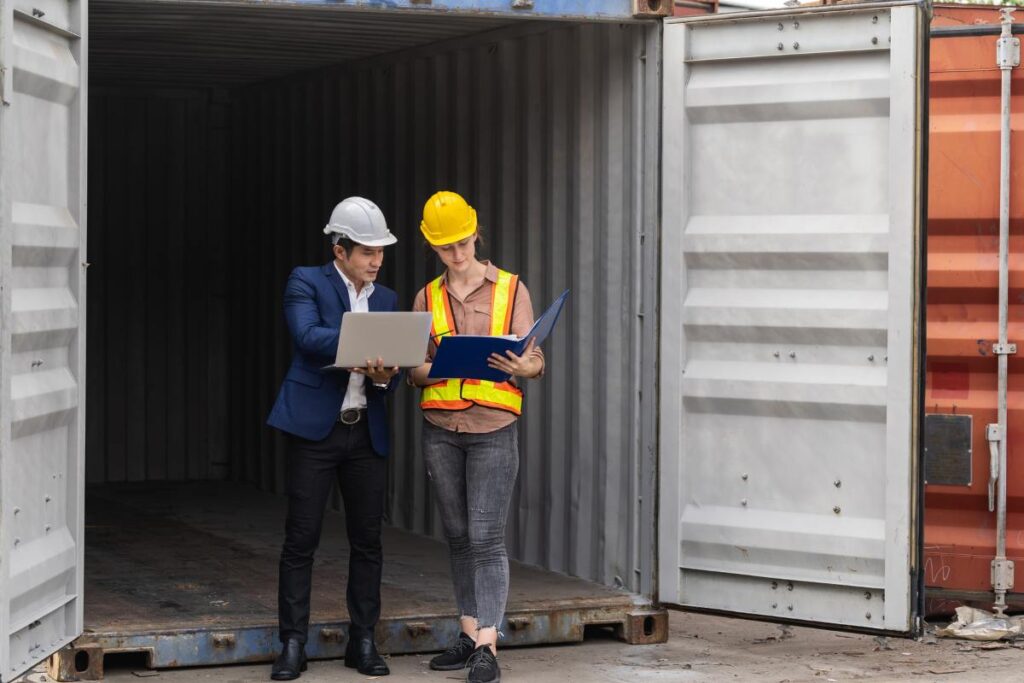What is a Customs Broker: What is their role and Why Do You Need One?
In global trade, dealing with international freight regulations and customs processes poses significant challenges for businesses. Customs brokers bridge the gap between business and regulatory demands, offering specialized services that facilitate the seamless movement and customs clearance of freight in international trade. They assist with customs clearance, provide compliance advisory and play a crucial role in ensuring that freight navigates through the complexities of the global supply chain without hindrance.
This guide seeks to shed light on the role of customs brokers in international freight movement, underscore their significance in cross-border trade, simplify the customs clearance process for freight, and delve into the costs associated with their services. Additionally, it offers actionable advice on choosing the right customs broker to cater to your business’s unique freight requirements, emphasizing the importance of their expertise for the successful handling of international trade challenges.
The Importance of Customs Brokers in Cross-Border Trade
Customs brokers are licensed professionals that specialize in the customs clearance process. They deal directly with the various government systems, port and airport authorities to ensure that shipments comply with the applicable customs regulations. Customs brokers must be licensed by the country’s relevant government authority.
Customs brokers are well trained in the various laws, regulations, and procedures pertaining to trade. They assist importers and exporters in navigating the complexities of tariff classifications, duty rates, and any applicable taxes or levies. By doing so, they help businesses avoid costly delays, fines, or confiscation of merchandise due to non-compliance with customs regulations.
They may provide a range of services, including calculating applicable duties and taxes, obtaining necessary permits and licenses, and arranging for inspections or quarantine as required by the destination country. By leveraging their expertise and relationships with customs authorities, they can expedite the customs clearance process, ensuring that goods are delivered in a timely manner.
Facilitating Hassle-Free Shipments
Customs brokers act as a bridge between businesses and the complexities of international logistics. They ensure that goods move across borders with ease and efficiency. By managing all aspects of the customs process, they prevent delays that could disrupt supply chains and impact business operations negatively.
Ensuring Compliance with Regulations
The landscape of international trade is governed by an intricate web of regulations that vary from one country to another. Customs brokers are well-versed in these regulations, ensuring that businesses comply with the latest trade laws and agreements. This compliance is vital for avoiding legal issues and penalties that could arise from inadvertent violations.
Navigating Complex Customs Processes
The customs clearance process involves detailed documentation and strict adherence to procedures. Customs brokers navigate these complexities on behalf of businesses, dealing with paperwork, duties, and taxes efficiently. Their knowledge and skills in handling these processes ensure that goods are cleared through customs without unnecessary delays or expenses.
By leveraging their specialized knowledge and skills, customs brokers provide businesses with the assurance that their goods will reach their destination promptly and legally. This allows businesses to concentrate on growth and development, secure in the knowledge that their international trade activities are in expert hands.
What is the Difference Between a Customs Broker and Freight Forwarder?
Customs brokers specialize in the work relating specifically to the customs clearance process. Whereas freight forwarding companies will provide a wide range of services to help transport shipments from origin all the way through to final destination.
Customs brokers need to be well-versed in the laws and regulations governing imports and exports, including tariffs, taxes, and permits. While freight forwarders can sometimes handle customs clearance as part of their services, customs brokers are the specialists who ensure that all customs regulations are met, helping to avoid delays, fines, and other issues at the border. Freight forwarding companies usually employ licensed customs clearance brokers in house, or contract a licensed customs broker to complete the customs clearance process.
The Customs Clearance Process

The process of customs clearance is a critical step in the journey of goods across international borders. It involves a series of steps designed to ensure that all imports and exports comply with the laws of the countries involved. Here’s a closer examination of this process:
Step-by-Step to Customs Clearance:
- Pre-Arrival: Before goods arrive at the border, the importer or the customs broker submits necessary export documentation, declarations and data electronically to the relevant government’s systems. This includes a detailed list of the goods, their value, origin and packaging.
- Arrival and Inspection: Once the goods arrive, they are inspected by customs authorities. This is to verify the goods match the documentation and meet all import regulations.
- Duty and Taxes Payable: If applicable, customs duties and taxes are calculated based on the declared value of the goods and their classification, as per HS or HTS Codes. Full payment of applicable import duties and taxes is usually required before the shipment can be released from customs.
The Indispensable Role of Customs Brokers:
Customs brokers act as the navigators through the maze of customs regulations. They prepare and submit all the necessary paperwork, ensuring accuracy to avoid delays. Their expertise extends to classifying goods correctly under the Harmonized System (HS) codes, which is crucial for determining duties and taxes.
Handling Declarations, Duties, and Taxes:
A significant part of the customs clearance process is dealing with the declaration of goods, calculating duties, and ensuring the correct taxes are paid. Mistakes in this area can lead to hefty fines or even confiscation of goods. Customs brokers use their expertise to accurately calculate these costs, ensuring compliance and preventing financial losses.
Navigating Customs and Border Protection Rules:
Customs and border protection agencies enforce rules designed to protect a country’s economy, environment, and safety. Customs brokers stay updated on these rules, including restrictions on certain goods, required permits for regulated items, and quotas. Their knowledge helps smoothly navigate these regulations, ensuring that the goods comply with all legal requirements.
Costs Associated with Customs Brokerage Services
Overview of Brokerage Fees
Fees typically include a service charge for the customs clearance process, which may cover document preparation, submission, and communication with customs authorities. Some brokers charge a flat rate per shipment, while any additional work will be charged on top.
It’s important for businesses to view customs brokerage fees within the context of their entire supply chain. Effective customs brokerage can prevent costly delays, fines for non-compliance, and other expenses that might arise from customs issues. While there’s a cost to these services, the value of ensuring smooth, uninterrupted trade often outweighs the expense.
Factors Influencing Costs
Several factors can influence the cost of customs brokerage services:
- Value and Type of Goods:
- International Trade Documents: High-value or regulated items necessitate comprehensive documentation to ensure compliance with international trade laws. This often includes:
- Commercial Invoices: Detail transaction values, descriptions, and parties involved.
- Certificates of Origin: Verify the country where the goods were produced, crucial for tariff applications.
- Export Licenses: Required for regulated goods, indicating permission to export.
- Safety and Inspection Certificates: Ensure goods meet the importing country’s safety standards.
- Increased Scrutiny: These goods are more closely examined by customs, requiring accurate and thorough paperwork to avoid delays or rejections, which can escalate costs.
- International Trade Documents: High-value or regulated items necessitate comprehensive documentation to ensure compliance with international trade laws. This often includes:
- Volume of Shipments:
- Frequent shippers with high volumes of goods often have the leverage to negotiate lower rates for customs brokerage services. This is because:
- Economies of Scale: Brokers may offer discounts as handling large volumes increases operational efficiency and reduces per-unit costs.
- Long-term Partnerships: High-volume business can lead to stronger relationships, fostering better rates and service levels.
- Frequent shippers with high volumes of goods often have the leverage to negotiate lower rates for customs brokerage services. This is because:
- Level of Service:
- Custom brokers offer a range of services that go beyond basic customs clearance, including:
- Consulting on Tariff Classifications: Expert advice to correctly classify goods, potentially reducing duty rates.
- Legal Advice on Trade Regulations: Guidance on navigating complex international trade laws to ensure compliance and avoid penalties.
- Service-Related Costs: While these additional services can add to the upfront costs, they provide significant value by minimizing the risk of costly errors, ensuring compliance, and optimizing duty payments.
- Custom brokers offer a range of services that go beyond basic customs clearance, including:
Choosing the Right Customs Broker for Your Business

Selecting the right customs broker is a critical decision for businesses involved in international trade. The right broker can enhance your operational efficiency, ensure compliance with global trade regulations, and save your business from incurring unnecessary costs. You shouldn’t choose a customs broker purely based on price. An experienced customs broker that ensures smooth customs clearance processes will be worth paying a higher price for. Here’s how to evaluate and choose a customs broker that aligns with your business needs:
Evaluating Service Quality
Look for brokers with a proven track record of reliability and excellence. High service quality often translates to accurate documentation, timely submissions, and smooth customs clearance processes. Ask potential brokers for references or case studies that demonstrate their capability and service quality. If you have trouble being able to speak to the customs broker directly, their level of communication may be a red flag.
Determining Business Needs
Your choice of customs broker should align with your specific business requirements. Consider the volume and frequency of your shipments, the nature of the goods you are trading, and any special handling they might require. Whether you’re shipping perishable goods, hazardous materials, or high-value items, ensure your broker has experience and expertise in those areas.
Considerations When Selecting a Provider:
- Licensing: Ensure the customs broker is licensed by the relevant authorities. In the U.S. for example, brokers should be licensed by the U.S. Customs and Border Protection (CBP).
- Geographical Coverage: Choose a broker that covers all the ports of entry through which your goods are likely to be shipped.
- Technology Use: Consider brokers who utilize modern technology for tracking shipments and managing documentation, as this can significantly streamline the customs clearance process.
- Communication: Effective communication is key. Your broker should be easily reachable and willing to provide updates and insights into the customs clearance process.
- Pricing: An experienced customs broker that provides a high level of service and communication will be much more valuable to your business. It’s worth paying a premium for a customs broker that will consistently ensure a smooth customs clearance process.
Final thoughts on Customs Broking
Customs brokers are key for businesses trading across borders. They help goods pass through customs smoothly by managing complex rules and paperwork, to reduce the risk of unnecessary fines, delays and other costly issues. An experienced customs broker can make trading easier, which will help you to focus on other areas of your business, such as growth, marketing and sales.
Don’t choose a customs broker based on the cheapest price. Finding the right broker is essential to be successful in global trade.









